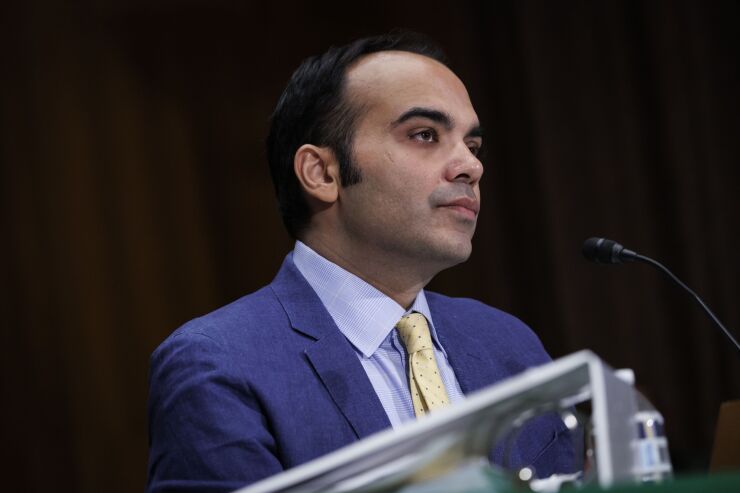
Citizens Bank has agreed to pay a $9 million fine to the Consumer Financial Protection Bureau to resolve allegations that it failed to properly manage and refund credit card customers with billing disputes and fraud claims.
The CFPB said on Tuesday that Citizens Bank, a unit of $222.3 billion-asset Citizens Financial Group, in Providence, R.I., agreed to settle allegations that it failed to investigate credit card billing disputes and fraud claims, and had failed to consistently refund all charges, including finance charges and fees.
The CFPB
The core issue in the CFPB's lawsuit was the allegation that Citizens had required customers with fraud claims to provide a notarized affidavit under penalty of perjury to support their claim. CFPB Director Rohit Chopra used the settlement to send a warning to other companies.
"Federal law provides important rights to credit cardholders when disputing transactions and resolving billing errors," Chopra said in a press release. "As outstanding credit card debt approaches $1 trillion, the CFPB will be closely watching the conduct of the credit card industry."
The CFPB said Citizens made consumers jump through burdensome hoops to report fraud. The bank failed to reasonably investigate and resolve billing error notices and claims of unauthorized use, and also failed to fully credit customers' accounts, the CFPB claimed. Citizens also "sometimes" did not refund all finance charges or fees owed to consumers, the bureau said.
In response, Citizens said that it voluntarily began remediation efforts and had contacted the CFPB in 2015 after the bank "self-identified operational errors" that may have impacted roughly 2% of its customers. The bank said its remediation "exceeded all obligations to make customers whole."
"While Citizens continues to disagree with the CFPB's stance with respect to these long-resolved issues, which were self-identified and voluntarily addressed years ago, we are pleased to put this matter behind us," said Polly Klane, Citizens' general counsel. "We remain proud of our commitment to transparency, our rigorous compliance programs, and our consistent effort to treat customers fairly and operate responsibly."
The agency's lawsuit against the Rhode Island company — the first involving a bank under Director Kathy Kraninger — has challenged assumptions about its approach to enforcement.
The CFPB alleged in the lawsuit that Citizens had violated the Truth in Lending Act, implemented by Regulation Z, that lays out the specific steps a consumer must take to report credit card disputes and fraud claims. The regulation also has specific timelines for investigating fraud claims and billing disputes, including sending notices to the consumer and refunding the error or fraud amount when claims are valid.
The CFPB said the bank did not acknowledge certain billing error notices and failed to send denial notices to inform customers that their dispute had been received. In addition, the CFPB said Citizens routed some customers who called a toll-free number to receive credit counseling information to the bank's collections department instead.
The CFPB ordered Citizens to fix its credit card practices and pay a $9 million fine to the bureau's victims relief fund.






